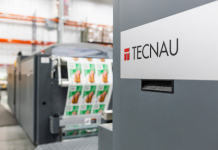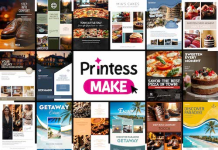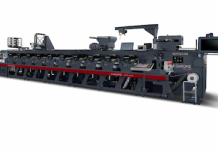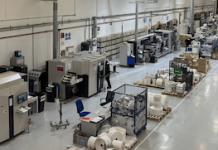Health is an important topic, especially during Covid-19. With that in mind, Printing SA partnered with Agility and Health Squared to bring a session filled with insights as to how attendees could harness these underplayed areas of their and their employees’ well-being.
Bianca Viljoen, Spokesperson for Health Squared Medical Scheme
Viljoen opened the discussion by unpacking in some detail the difference between absenteeism and presenteeism and the impact these factors have had on not only the printing industry, but the entire economy. Leading on from these explanations, Viljoen highlighted the various issues that may contribute to either absenteeism and presenteeism, and how employers can proactively assist their employees in mitigating the possible negative knock-on effects of these.
One of the ways in which employers could assist their employees was by the provision of access to an Employee Wellbeing Programme, as offered by Health Squared, that aids employees in dealing with their personal circumstances that directly affect their productivity. This unique programme offers employees access to free legal advice and financial counselling that can alleviate the stresses brought about by Covid-19.
In closing, Viljoen shared how there has been a noticeable increase in mental wellness related issues over the past eight months and how Health Squared had stepped in to assist employers and employees alike.
Please explain the difference between absenteeism and presenteeism within the workplace
‘During Covid-19 we have seen some very interesting terms emerge in the work space, and more particularly in the printing and packaging industry,’ said Viljoen. ‘Absenteeism can be planned, or due to illness – it is quantifiable. Presenteeism impacts on a business to a large extent and occurs when an employee is at work but is not being productive. It impacts the economy on a massive scale. Research has indicated that unproductive employees can cost the economy up to R89 billion per annum.’
Contributing factors towards presenteeism include family issues, divorce and social issues, which result in lack of concentration. This is especially true in the printing industry, with a lot of dangerous machinery. Employees need to be as productive and engaged as possible and employers have to take note of their employees’ productivity.
How does this affect employer and general employee productivity?
‘Mental well-being from the employee’s perspective could mean something like the onset of depression because they have not been able to earn any income or as much as they had in the past. Employees’ productivity and their general mental well-being has been significantly affected,’ said Viljoen. She explained that inferior products might be produced due to less productivity, and that absenteeism and presenteeism is primarily driven by mental well-being.
How can employers in the industry effectively address and reduce challenges around productivity, absenteeism and presenteeism?
‘We find that proactive or targeted intervention within this measurement of factors contributing towards absenteeism and presenteeism can significantly reduce the impact on productivity. So an effective employee assistance programme, whether it be a core plan or comprehensive plan, can help employees to cope better with personal challenges and improve their mental well-being,’ said Viljoen.
These would encompass debt management programmes or access to a financial counsellor, as financial troubles have significant effects, and create a great deal of stress. Other interventions include flexible insurance benefits (employees must have access to healthcare), as well as positive reinforcement from an employer’s side, especially during Covid-19.
Have you seen an increase in mental health claims in 2020, and specifically, in the months following lockdown?
According to Viljoen, while a like-for-like comparison between 2019 and 2020 treatment and claims cannot yet be done, an evaluation on an ICD-10 diagnosis level has been done. Subsequent to the evaluation, they have identified a 26% increase in total admissions for recurring depression during 2020, when compared to 2019 admission rates.
What mental health conditions are covered under prescribed membership benefits (PMBs) and what are the requirements for this to be met?
Viljoen explained that there are two chronic mental health PMB conditions: bipolar mood disorder and schizophrenia. The clinical criteria for a PMB psychiatric disorder is wide-ranging and the diagnosis is based on assessment of each unique and individual case.
In addition, Health Squared provides more extensive access to all their members for non-PMB mental health and psychological conditions such as major depression and related affective disorders. Depression is not necessarily a PMB, but must still be taken seriously.
What are the most common reasons for mental health medical scheme claims?
‘Increases in conditions such as stress, burnout, post post-traumatic stress disorder (PTSD) and bipolar health issues has skyrocketed over the past 6-8 months, and a contributing factor was lockdown. We find that people aren’t as confident to go out and speak to someone.’
What support are you providing as a medical scheme in the current pandemic climate for medical scheme members with mental health issues or even just members battling with high stress levels?
According to Viljoen, Health Squared members and Agility clients in the printing industry have unlimited access to telephonic assistance with financial matters, psycho-social assistance, healthcare and legal advice, which can provide helpful feedback to guide rational and reality-based decision making. In stressful times such as these, such services can assist individuals to better manage their response to the circumstances they are facing.
Employer groups enrolled on Health Squared or making use of the Agility Corporate solution access these services through the free Agility Employee Well-being Core Programme, which is available at no cost to all employer groups, while individual Health Squared members access the telephone assistance services through the Agility Rewards programme. Furthermore, all members that are currently undergoing treatment continuously have access to their providers of choice, which is also funded via a tele-consult method.
What medical scheme benefits are available for mental health?
The Health Squared medical scheme provides comprehensive cover for defined PMB psychiatric conditions, as per The Council for Medical Schemes’ PMB guidelines. In addition, the treatment of mental and psychological conditions are closely monitored and managed by Agility’s Patient Drive Care™ (PDC™) programme.
Upon diagnosis, members obtain a personalised Treatment Care Plan, which includes consultations, treatment and medication associated with their diagnosis. ‘As part of the personalised Treatment Care Plan, flexibility is built into the formulary, as the company allows variability to accommodate patient tolerance and response to medication as opposed to a short-term view fixated on the cost of medication,’ said Viljoen.
Elri van Zyl, Printing SA Regional Manager for the Central Chamber
Van Zyl shared her insights and experience on how Covid-19 had impacted almost all sectors. Amongst these, she emphasised how management within the printing industry had been forced to make some very tough decisions when dealing with retrenchments and the like. The overall result of the uncertainty created by Covid-19 had a monumental impact on employees’ mental wellbeing and morale – even those not facing retrenchments or pay cuts.
What was the biggest influence that lead to retrenchments, short-time and temporary lay-offs and has it impacted employees’ mental health in 2020?
‘In March, South Africa went into hard lockdown. Initially, this period was supposed to last for three weeks and was later extended,’ said van Zyl. ‘Many printers were not able to operate as a result. After lockdown passed, only certain businesses could operate.’
Many challenges emerged – business had to find out how to pay staff and salary sacrifices followed. Although TERS has brought relief and been praised, and member companies supplied food parcels to assist with basic needs for their employees, operational procedures were hard to plan, and businesses did not know what government was going to do next. There was immense pressure on everyone at work.
What is the emotional impact and mental health issues when retrenchments are implemented from an HR perspective?
‘There was a lot of uncertainty. We always think it is only the retrenched employee that is affected, but that is not the truth, even employees that remain behind in the business are impacted,’ said van Zyl.
There was a decline in the need for print since Covid-19. ‘Managers of businesses were tormented when they had to decide to take the retrenchment route. We know that there is a physiological and psychological impact when you lose your job. In South Africa, when a person is retrenched, that person has 7-11 related dependents. It has a huge impact on society and the country as a whole.’
Strain was placed on businesses and management. Staff left behind became demotivated, and there was a form of resentment harboured for decisions made, even though in labour relations the saying goes that retrenchment is a ‘no-fault’ situation.
Retrenchment leads to a loss in identity, almost like being in a divorce, with loss and grief. With recruitment on the decline, a retrenched person must seek counselling, but is usually reluctant due to financial issues.
How did Printing SA assist members with health-related issues?
‘As the economy opened up again, government published a health and safety Covid-19 directive, giving guidelines to businesses to help identify risk. That meant that business had to do risk assessments. Government gave us guidelines such as that two masks had to be issued to employees, and that there needed to be sanitation in place, etc. Printing SA also compiled a risk assessment for the industry that assisted our members to implement these guidelines from government.’
Other forms of assistance included helping members with hearings, as well as referring those who were retrenched to the Printing SA website, where they could upload their CV’s and view vacancies.
Steve Thobela, Novus Print Executive: South
Thobela was able to share some of his knowledge on the effects of Covid-19 and how this completely caught management of many organisations entirely unprepared. He concurred with many of the sentiments expressed by both Viljoen and Van Zyl and for this reason had a vested interest in ensuring that the printing industry is paired with a reputable healthcare organisation such as Health Squared Medical Scheme.
Thobela acknowledged that Health Squared fully understood the shifts in the printing industry, how the industry operates and the real needs or challenges faced by the sector across the entire earnings spectrum. As such, the scheme had provided innovative solutions tailor-made for the industry and through their integrated, single point of contact, had proved themselves beyond reproach.
You have served as Chairman of Health Squared, can you please share your experience with the scheme?
Thobela is a former CEO of Printing SA. In explaining why he accepted to serve on the medical aid board, he said that he wanted to see Printing SA continue to play the vital role of assisting its members, as well as wanting to see how other service providers and stakeholders could contribute to the printing industry.
‘We needed to find a medical aid relevant to the industry – that is unique – because a large medical aid will not understand the shifts in the printing industry or how the industry operates or what the real needs or challenges of that industry are. I saw an opportunity to introduce a medical aid that was unique to the industry and that could serve the industry in the best way possible. It was absolutely necessary for me to continue that role. We have come up with a few unique options,’ said Thobela.
The Medical Aid industry is highly regulated, would you like to share how the scheme is able to offer benefits and/or services that are unique to the print, packaging and signage industry?
‘As a result of the medical aid industry becoming so highly regulated, it becomes a challenge to come up with benefit options suitable for individual industries around the world. But even with that challenge, we came up with very unique options, unique in that it addresses particular needs in the printing industry,’ said Thobela. ‘The traditional options did not have a savings plan. We had to find a creative way to build benefit structures where you can build a savings linked to these traditional options.’
Benefits would be depleted quickly, so savings become absolutely necessary. As a result, the plan that was devised was that if one’s benefits depleted, one could switch automatically to the savings, and if that is not adequate, debt cover kicks in. All of these are linked one way or another. Medical aids were assessed, from those at the highest senior level to junior staff, as it is problematic to have one structure, so this medical aid scheme caters to everyone’s types of earnings.
‘Absenteeism and presenteeism cannot be addressed without programmes like these. Another important factor is risk premium. You need to make sure that whatever medical aid you have, there is an affordable risk premium that is paid, otherwise it is a huge amount that you have to pay elsewhere. A lot of arrangements have been made that cater specifically for the printing industry,’ added Thobela.
Given the challenges brought about by Covid-19 do you think the scheme could assist the industry in some way on its way to recovery?
‘The impact comes down to the cost. We are going to have to manage our costs tightly. There is a challenge because you want to give the employee the best benefits possible,’ he said.
Thobela also said that with time, options can be reassessed as remuneration for the employee improves. ‘You don’t have to switch between medical aids, because we have got these medical aid options that are available.’
Watch the full webinar below:
For more information on Agility, please visit www.agilitydistribution.co.za or call (+27 21) 918 6210.
+27112871160
info@printingsa.org
http://www.printingsa.org





















